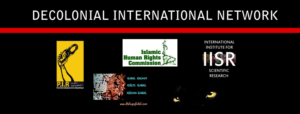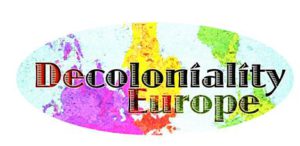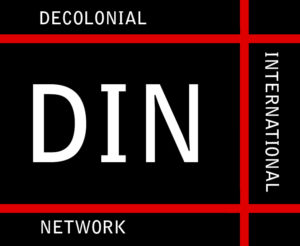Sheher Khan
The popular imagination of terrorism doesn’t always correspond to the actual developments. One such a misconception is that most terrorist attacks in the West are committed by al-Qaeda, Daesh and the likes (from now on Takfiri terrorism). Whilst these violent incidents are very deadly indeed, they don’t constitute a majority of the attacks – especially in the West. Another misconception is that we’re supposed to be living in a so-called “golden age of terrorism”. These misconceptions exaggerate the impact of Takfiri terrorism (as well as the role played by refugees and newcomers therein), deflects from other relevant and related developments (such as the growing threat from the extreme right) and absorbs attention from regions that bear the brunt of terrorism (i.e. the Global South). In this piece, I’ll try to answer the following five commonly heard misconceptions with my own analysis:
- Most attacks in the western world are not committed by Takfiri terrorists;
- Terrorism is more of a problem for the non-western world than in the western;
- Terrorist incidents have been on the decline in Western-Europe, especially since 9/11;
- The underestimated increasing threat from the extreme right;
- The overrated role of refugees and newcomers in terrorism.
1. Takfiri terrorism: a minority of the attacks
This might come as a surprise to many, but: Terrorism in the west is not the exclusive domain of al-Qaeda, Daesh, and the like. In fact, when looking at it from a quantitative angle, an insignificant amount of terrorist attacks between 2006 and 2013 in the European Union (EU) was committed by the aforementioned groups, namely: 0.7%. The biggest threat, according to Europol, during that period came from separatist quarters.
Think hereby of groups such as the IRA, ETA and PKK. An example: the Irish separatist group Dissident Republicans, also known as the “new IRA”, made one deadly victim in March 2016 when they detonated an explosive that was put under a prison keeper’s van. Another: British Labour-politician Jo Cox was killed by a right-wing extremist, Thomas Mair, in June 2016 because of her position on Brexit.
A similar image can be seen in the United States (US). Figures from the FBI show that 94% of the terrorist attacks, in the period from 1980 to 2005, were committed by perpetrators that did not have an Islamic profile. A study conducted by the National Consortium for the Study of Terrorism and Responses to Terrorism concluded that between 1970 and 2011 only 7% of all attacks were committed by terrorists with a “religious conviction” (hereby referring to al-Qaeda and similar groups). The largest percentage (32%) came from groups motivated by an etho-nationalist or separatist agenda, followed by (28%) single issues parties (such as animal rights or anti-war), 22% from the extreme-left and 11% extreme-right. A famous example is the massacre committed by white nationalist Dylann Roof. The 21-year-old white supremacist unleashed his firepower on African-American churchgoers in Charleston and took nine lives.
The situation changed however after 2013. In 2014 one attack was committed by a Takfiri terrorist; by 2015 it rose explosively to 17 (out of a total of 121 attacks). In 2016 it dropped slightly to 13 (of the total 142 attacks). Even though Europol reiterated in her latest report (2017) that most attacks (i.e. 99 of 142) come from separatist movements , the attacks from Takfiri quarters were very deadly. Between 2000 and 2013 40% of all deaths by terrorism in Europe were caused by Takfiri groups. The violent acts in recent years such as Brussels (2016), Nice (2016) and Paris (2015) took respectively 32, 84 and 130 lives. Their share of the deadly victims of terrorism in Europe has risen in 2016 to include almost all (i.e. 135 victims out of a total of 142). More on this below.
In conclusion: Takfiri terrorist attacks are clearly very lethal, but not the only danger. Extreme-right, separatist and ethonationalist groups constitute also a major threat.
2. The size of the fatal consequences of terrorism in the non-western world
A number of pundits and commentators have highlighted the disparity in reporting on terrorist attacks in the west and non-western world. It seems that terrorist incidents in the Global South doesn’t receive the same exposure and attention as those in the West. As the Lebanese doctor Elie Fares wrote after the 2015 terrorist attack in Beirut (which occurred at the same time as the attack on Charlie Hebdo): “When my people died, no country bothered to light up its landmarks in the colors of their flag” wrote. He further wrote on his blog: “When my people died, they did not send the world into mourning. Their death was but an irrelevant fleck along the international news cycle, something that happens in those parts of the world.”
This commonly heard statement is supported by a study conducted by sociologist Sean Darling-Hammond. The researcher collected data from each of the 300 reported terrorist attacks in November 2015 and compared the number of articles devoted to the violent acts. Darling-Hammond observed 392 articles dedicated to the terrorist attack in Baghdad; 1.292 to Beirut and more than 21.000 on the violence in Paris. The researcher concluded that Western victims disproportionately receive more attention than their fellow victims in the non-western world.
The underreporting doesn’t only feed into and sustains indifference of violence inflicted upon the Global South, but also obscures the real impact of terrorism on the non-western world.
A Washington Post research article gives insight in to the actual scale and size of impact felt by terrorism globally. As they write: “Since the beginning of 2015, the Middle East, Africa and Asia have seen almost 50 times more deaths from terrorism than Europe and the Americas” the Washington Post. The graph below visualizes the ratios:
Victims of terrorist attacks beyond Western Europe (period 2001-2014)
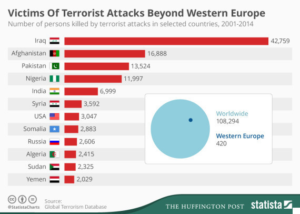
Source: Huffington Post (2015)
The top three consists of Muslim-majority countries. The first western country on the list is the US at # 7. When 9/11 is taken out of the equation, no single western country remains in the top ten. Even the total deaths by Daesh in the west wouldn’t earn a top ten spot (443 victims). According to the 2017 ICCT-report, 395 Western citizens died because of terrorist attacks by Daesh from June 2014 to June 2017. I’ve added the Manchester-attack (22 civilians killed), the following London-attack (8 killed), Catalonia attacks (16 killed) and Turku (2 killed).
Terrorist violence thus is mostly felt in the non-western world.
Another way to look at the above figures is through the lens of the Global War on Terror: the top ten consists of countries that were subject to or felt the consequences of the US-led antiterrorism project. This is shown better in the graph below:
Global deaths from terrorism
 Source: economist.com
Source: economist.com
Take Iraq. The US invaded the Arab country in 2003 for two reasons: 1) The then leader, Saddam Hussein, was thought to have chemical weapons in his possession and 2) that he was providing shelter for al Qaeda – both claims turned out to be unfounded.
However, the consequences of the invasion were very real: eleven years after the illegal invasion, in 2014, more Iraqi’s became victims of terrorist violence than the total world number (!) In 2001 – that is, the year in which 9/11 happened and ignited the US-led Global War on Terror.
Iraq – where no suicide bombings were registered before 2003 – has been completely destabilized by the illegal invasion and more than 40,000 casualties by terrorist violence have been recorded ever since.
The next question that then arises: why are these figures missing out in the public discourse? According to intellectual Noam Chomsky this is not just due to a lack of media-attention, but because of a political culture wherein victims are differentiated between worthiness – i.e. worthy and unworthy victims. Chomsky explains his thesis with the following example: in 2007, a poll was conducted among US citizens asked to estimate the total number of deaths in Iraq. The median was 10,000. The actual number then was between 150,000 and 650,000 deadly victims. According to Chomsky, the disparity is a consequence of a targeted campaign by the US: they aim to suppress media reporting on (deadly) civilian victims caused by their occupation of Iraq. The purpose is to diminish its role in and prevent a discussion of their occupation of Iraq.
And when are civilian casualties considered ‘worthy’ enough according to Chomsky? That’s when their deaths can further Washington’s foreign policy. This was demonstrated in 2014 when the former US president, Barack Obama, used the threat of Daesh to get “boots on the ground” in Iraq. In 2011, then President Nouri al-Maliki refused to extend the stay of the US Army. That led to dissatisfaction and resistance in Washington who preferred not to leave. When Daesh came on the Western radar in 2014 and threatened civilians worldwide, that danger was used as a pretext to increase the number of US troops in Iraq. The (potential) victims of Daesh were in this context seen as ‘worthy victims’ because they could help Washington’s regional agenda.
3. Downward trend of terrorism in Western Europe
Contrary to popular imagination, the years after 9/11 are marked not by an increase but decrease of terrorist violence, especially in Western Europe. This is in opposition to the doom scenarios painted by some pundits and their statements of a “golden age of terrorism”. A statistical analysis shows however a contrary image and depict an overall downward trend. See the chart below:
Kill by terrorist attacks in Western Europe (1970-2015)
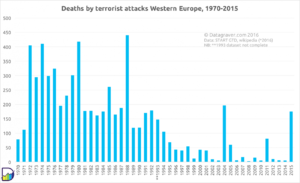 Source: Datagraver.com
Source: Datagraver.com
The figures above clearly show that there were significantly less fatal victims in the period after 9/11 than in the 21 years before. That trend began after the fall of the Berlin Wall (1989) and has continued ever since except for outliers like Madrid (2004), London (2005) and Paris (2015).
Furthermore, when deadly victims of terrorism in Europe are divided between west and east, the following picture shows up: the majority of the victims in the past 15+ years fell in the eastern part of the continent (see below):
Kill by terrorism per month: West versus Eastern Europe
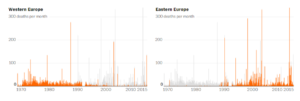 Source: Washington Post
Source: Washington Post
Experts explain it as a consequence of the disintegration of the Soviet Union and the conflicts resulting from it such as those in Yugoslavia, Chechnya and Ukraine. An important and lesser known example of such a deadly attack is the Odessa (Ukraine) clashes in 2014. During one of those confrontations, on May 2, 46 people were killed by the neo-Nazi-linked Pravy Sector because of their pro-Russian affiliations. The map below visualizes how these attacks are divided throughout Europe:
Geographical distribution of terrorist attacks in Europe between 1970 and 2015

Source: Washington Post
In conclusion, terrorist attacks before 9/11, especially in the 70s and 80s, exceeded today’s level of activity. Violent incidents have overall been on the decline since 9/11. Moreover, the impression that most deadly attacks occur in the Western-Europe cannot be supported by the actual distribution of violent incidents; that burden falls on the eastern part.
4. Growing threat of extreme right violence
The Charleston-attack – whereby a neo-Nazi linked extremist weaponized his car to plow into a group of anti-fascist demonstrators and thereby killing one woman and injuring many others – is one of many examples in the recent history demonstrating an increasing threat coming from the extreme-right.
Indeed, a recent study has shown that 1/3 of all so-called lone-wolf terrorists in Europe are linked to the extreme right. Research from the US shows that far right extremists are even of a greater threat than Takfiri terrorism. Think-tank New America found out that nearly two times more casualties have fallen, between 9/11 and 2015, by hands of white supremacists than by Takfiri terrorists. This study is supported by a recent investigation (2017) held by the United States Supreme Audit Office – a.k.a. the Government Accountability Office (GAO). The GOA concludes from their survey that the extreme right is responsible for the bulk of all fatal terrorist attacks: 73% versus 27% by Takfiri terrorism.
However, when terrorist attacks are ranked in terms of casualties, we can make the same observation as in Europe: Takfiri terrorist attacks are on average far more deadly. Nevertheless, this doesn’t negate nor diminish the growing threat coming from rightwing terrorism. The cases of Anders Breivik, the Dutchman Tristan van der Vlis and Dylann Roof are relatively well-known, but as the following examples show, the danger from the right-wing have been building up in recent years and on the rise throughout the western world:
- In 2013, the 82-year-old Mohammed Saleem was stabbed to death by a terrorist with extreme-right affiliations while he came from a mosque visit. Saleem died soon afterwards. The same fate was inflicted upon to 81-year-old British Muhsin Ahmed two years later. In the following year, in 2016, Labor-politician Jo Cox was shot by an right-wing terrorist because of her political position on Brexit;
- In the US, Muslims and African Americans have been killed – and in some cases even executed – by white racists because of their religious and/or ethnicity backgrounds. Other (religious) minority groups such as Hindus and Sikhs have also been subjected by a similar fate, often because the extreme right confuses and/or regard them the same as Muslims;
- In the Netherlands a terrorist attack was committed in a mosque by a group of five extreme right-wing racists in 2016.
- In Greece, a refugee camp was attacked in 2016 by a group of right-wing extremists;
- In early 2017, an extreme-right terrorist attacked a mosque in Canada Quebec. The perpetrator shot on worshippers as they were praying and killed 6 civilians.
In short, this select overview makes clear that extreme right-wing terror is not only in the march but a phenomena to be seen throughout the West.
5. The overestimated role of refugees and newcomers in terrorism
A persistent myth spread (but not exclusively) by the (extreme) right is that the inflow of migrants and refugees leads to more terrorist violence. Studies, however, show that the role of migrants and refugees in terrorist attacks have been exaggerated.
The ICCT, a research institute in The Hague (Holland), investigated all of Daesh’ linked terrorist attacks in the west and found out that 73% of all attackers were citizens of the same country where they committed their act of violence. Another 14% were visitors or residents with a (legal) residence status. A further 6% remained in the country without documentation and only 5% were refugees or newcomers (see below).
Graphs of origin attackers
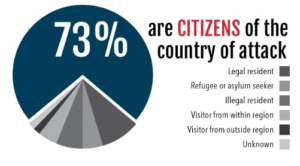 Source: ICCT (2017)
Source: ICCT (2017)
The vast majority of the danger (95%) comes from citizens or residents without a recent history of migration.
The findings from the ICCT report (2017) is broadly shared by other similar studies. British think-tank The Henry Jack Society (2017) found out that, in the case of Great Britain, more than two thirds of the attacks since 2005 were done by individuals “who were either born or raised in the UK”. In an another research by The New America Foundation “every jihadist who conducted a lethal attack inside the United States since 9/11 was a citizen or legal resident“. This study is corroborated by a recent research conducted under the guidance of political scientist Robert Pape. They found out (2017) that there were zero refugees involved in the 112 Daesh-related crimes. Lastly, liberal think-tank Cato concluded that the role of immigrants and refugees in terrorist attacks is minimal. Virtually all dead whereby immigrants or newcomers were involved come from one single event: 9/11 (98.6%). Apart from that, fatal terrorist attacks by immigrants or refugees are extremely rare in the United States.
However, with recent attacks such as Berlin (2016), Ansbach (2016) and Copenhagen (2016), the proportion of newcomers in attacks has significantly increased. According to the ICCT (2017), the influx of refugees and migrants is not the problem per se, because “the number of criminals and terrorists in mass migration movements has been low” and “terrorists often have a criminal background to begin with”.
Moreover, Daesh focuses its operations primarily on the conflict in their home territories in Iraq and Syria; newcomers and immigrants are fleeing those places because they are against the terrorist groups. The researchers of the ICCT therefore argue that the focus should be on proper regulation of the inflow of newcomers.
Secondly, as Brookings Institute scientist Daniel L. Byman argues, the problem are not the immigrants or refugees, but to them in coming contact with local radicalization-hubs.
Indeed, we see that clearly in the case of the 22-year-old Syrian newcomer, Jaber al Bakr, who was arrested on October 2016 on grounds of planning to commit a terrorist attack.
Jaber al-Bakr arrived in Germany in February 2015 and received legal residence five months later. According to Al-Bakr’s brother, Alaa al-Bakr, Jabr was not politically active or interested in Germany before arriving there. That changed after. In Berlin, Jabr al-Bakr came into contact with extremists. A local imam is thought to have brought him into contact with and urged him to fight for Daesh in Raqqa (Syria).
In September 2015, Bakr left Germany from Syria through Turkey, where he spent about five months and then two in Syria. On his personal Facebook page, it appears that al-Bakr began to sympathize with Daesh from January 2016. About two months before Jabr wanted to commit his violence, he was arrested by the German authorities. He could be detained because another Syrian newcomer arrested and handed him over to the police (after which the suspect, Jabr al-Bakr, hung himself later in his cell).
To conclude, the vast majority of Daesh terrorists are citizens of the same country in which they have committed their violent act. Only a small number of IS-affiliated terrorists are newcomers or undocumented citizens. If then there the goal is to stop or reduce terrorism, more attention should be paid to local radicalized groups rather than border surveillance.







